Introduction
In an increasingly digital landscape, organizations face the critical task of maintaining optimal server performance and security. Outsourced server monitoring has emerged as a strategic solution, allowing businesses to delegate these responsibilities to specialized third-party providers. This approach not only alleviates the pressure on internal teams but also leverages expert knowledge and advanced technologies to ensure continuous oversight.
As companies navigate the complexities of IT management, understanding the advantages and types of outsourced monitoring services becomes essential. With a projected growth in outsourcing trends, particularly in server monitoring, organizations are poised to enhance their operational efficiency and fortify their security measures, making informed decisions crucial for future success.
Defining Outsourced Server Monitoring: An Overview
Outsourced monitoring of systems is a progressively strategic practice where entities assign the oversight and management of their performance and security to specialized third-party service providers. This approach enables businesses to tap into expert knowledge and advanced technologies, ensuring that their server environments are continuously monitored for performance issues, security threats, and compliance requirements. By outsourcing this function, companies can alleviate the burden on their internal teams, allowing them to concentrate on core operations and strategic initiatives.
As noted, IT help desk services involve troubleshooting problems, addressing inquiries, and resolving technical issues, which are essential for users to access the necessary tools and resources to perform their duties. This resource management is crucial as entities scale, particularly when they face challenges such as talent acquisition. With approximately 78% of CFOs reporting that outsourcing has facilitated a focus on strategic, value-added activities, the trend towards outsourced server monitoring is set for significant growth in 2024.
This shift not only enhances operational efficiency but also fortifies security measures, especially in entities experiencing rapid growth or needing to mitigate risks associated with employee access management. For instance, companies often choose to outsource employee IT administration when they require efficient onboarding processes or need to eliminate security risks from ex-employees. Such real-world instances demonstrate how outsourced server monitoring can enhance efficiency and security, making it a prudent decision for companies navigating today's intricate IT environment.
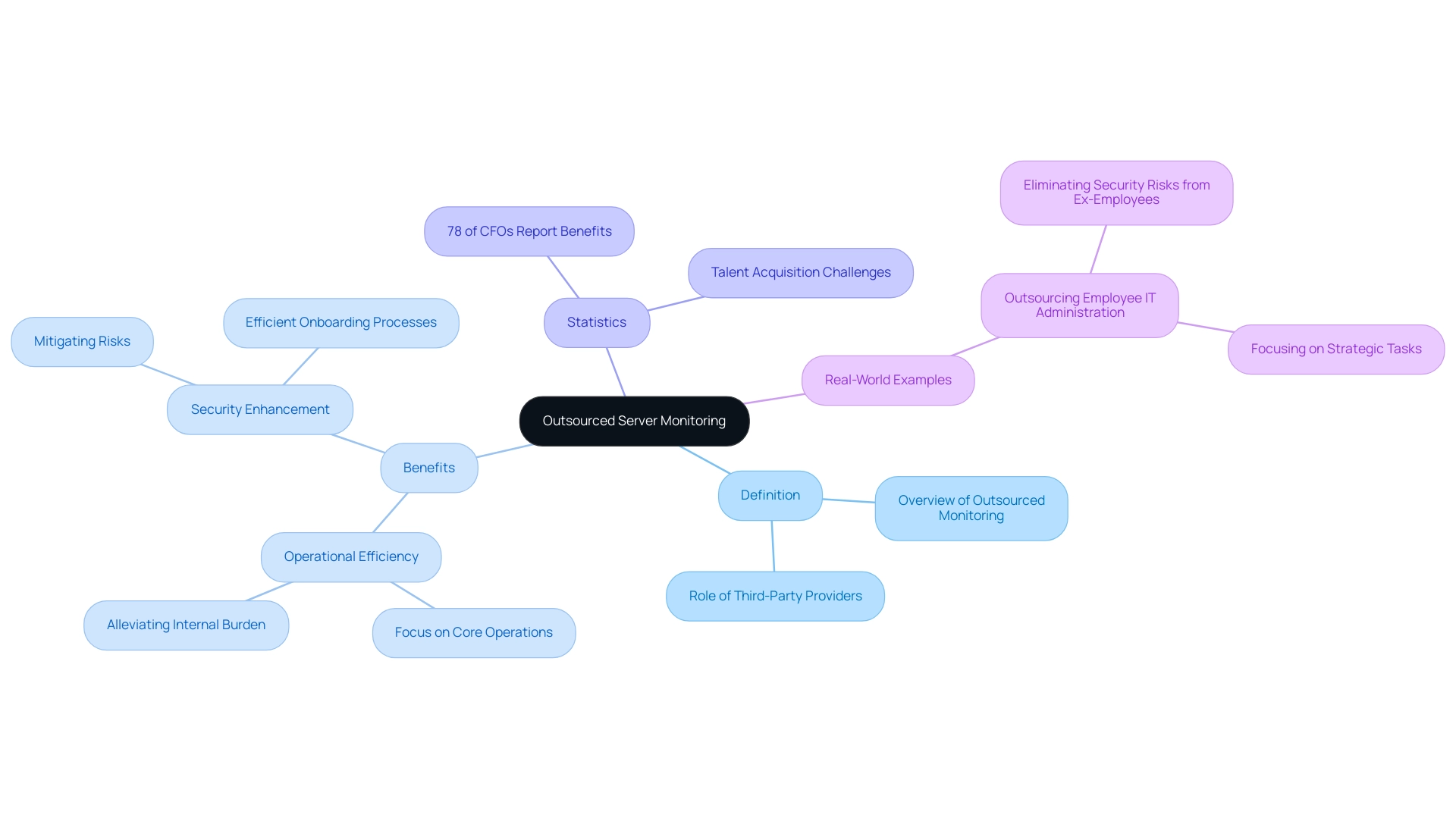
Key Benefits of Outsourcing Server Monitoring
Delegating oversight of systems through outsourced server monitoring provides numerous attractive benefits for entities aiming to enhance their IT functions. Firstly, Cost Savings play a pivotal role; outsourcing enables companies to significantly decrease their reliance on in-house staff and infrastructure, leading to substantial financial reductions. It is projected that global spending on outsourcing will reach $1.1 trillion by 2025, indicating a strong trend towards cost-effective solutions in IT.
Furthermore, as John David-Lovelock, Research Vice President and Analyst at Gartner, highlights, by 2027, IT contractors will account for 50% more expenditure than internal IT staff due to the challenges in retaining skilled personnel. This shift underscores the economic rationale behind outsourcing. For instance, global tech leaders like Microsoft, Mercedes, and Siemens have chosen Ukraine for software development outsourcing, benefiting from cost savings and access to a skilled workforce, which reinforces the strategic advantages of outsourcing monitoring.
Clients of STS Consulting Group have echoed similar sentiments regarding cost efficiency:
- "I was really impressed with the way STS Consulting Group handled everything. From the first conversation to everything in between, they were very helpful and knowledgeable."
Secondly, organizations can gain Access to Expertise through third-party providers. These specialists bring a wealth of knowledge and experience to the table, enhancing performance and security. In a landscape where technological advancements require higher skill sets, this expertise becomes invaluable.
Outsourced server monitoring solutions, for instance, engage proficient experts who use sophisticated instruments and techniques to proactively recognize and address potential risks, ensuring strong system security. One client noted,
- "STS Consulting Group was the missing piece to my puzzle. From start to finish, they solved every problem and helped us achieve our goals in the most professional way possible."
Additionally, outsourced server monitoring is a critical benefit. Outsourced server monitoring solutions employ advanced security measures and protocols to protect against potential threats, ensuring that servers stay secure and adhere to industry regulations. For instance, numerous providers adopt real-time oversight and threat identification systems that can swiftly react to security incidents, demonstrating how outsourced solutions effectively improve security measures.
A client remarked,
- "Using STS Consulting Group helped me save weeks of work. Their delightful level of quality and service is consistent and one of a kind. I can't recommend STS Consulting Group enough."
Lastly, outsourcing allows businesses to Focus on Core Business operations. By assigning responsibilities for system oversight, companies can focus their attention on core goals and innovation efforts, instead of becoming overwhelmed with IT management. This strategic approach not only streamlines operations but also fosters an environment conducive to growth and technological advancement.
The expansion of the domestic outsourcing sector, which generated a net of 4.5 million new positions in the U.S. from 2010 to 2020, illustrates the increasing demand for skilled experts in this field, emphasizing the notable advantages of outsourcing system oversight.
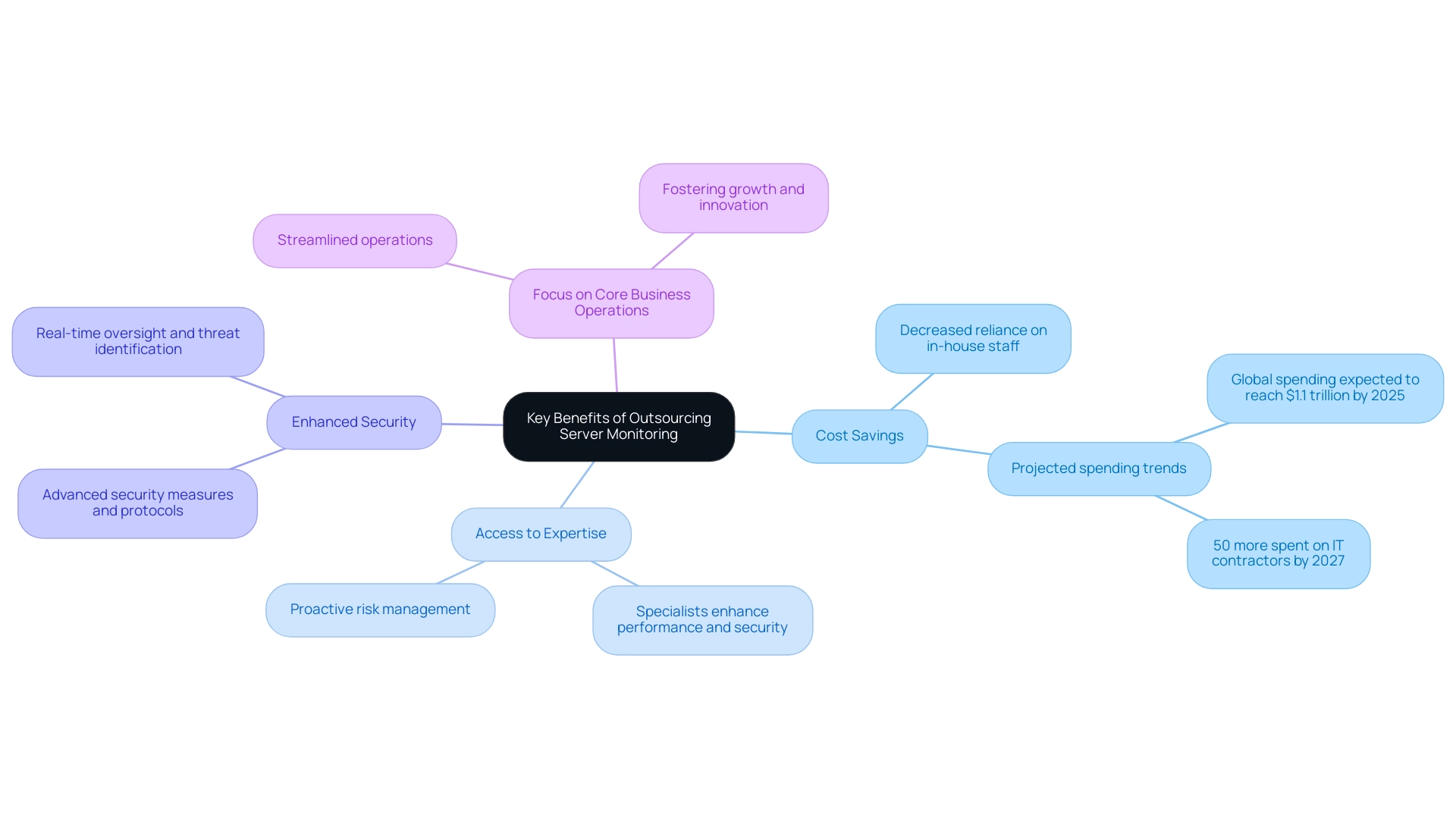
Types of Outsourced Server Monitoring Services
External oversight solutions include a range of specialized fields that meet the varied requirements of organizations. These include:
- Infrastructure Monitoring: This offering is essential for evaluating the health and performance of computer hardware and network devices, ensuring that all infrastructure components operate optimally.
- Application Oversight: Concentrated on observing the performance and availability of software applications, this type of oversight ensures that applications functioning on machines operate smoothly and without interruption.
- Security Monitoring: This critical function is dedicated to identifying and mitigating security threats, such as unauthorized access and malware attacks, thus safeguarding organizational data.
- Compliance Monitoring: Ensuring that servers adhere to industry regulations and standards, compliance monitoring helps organizations avoid legal repercussions while maintaining operational integrity.
Each of these offerings can be tailored to meet the unique needs of a business, providing flexibility in outsourced server monitoring arrangements.
According to HCL Technologies, the revenue from operations has demonstrated significant growth from FY 2015 to 2023, reflecting the rising demand for such offerings. As noted by an industry expert, "Keeping an eye on outsourcing statistics and trends will help guide you toward strategic decisions that will pay off for your bottom line in the long run." The strategic selection of oversight options can significantly affect a company's operational effectiveness and risk management.
Furthermore, with Microsoft Azure being the most utilized cloud provider among businesses, it underscores the significance of choosing the appropriate oversight services to support cloud infrastructure. Therefore, it is imperative for CTOs to carefully evaluate their options.
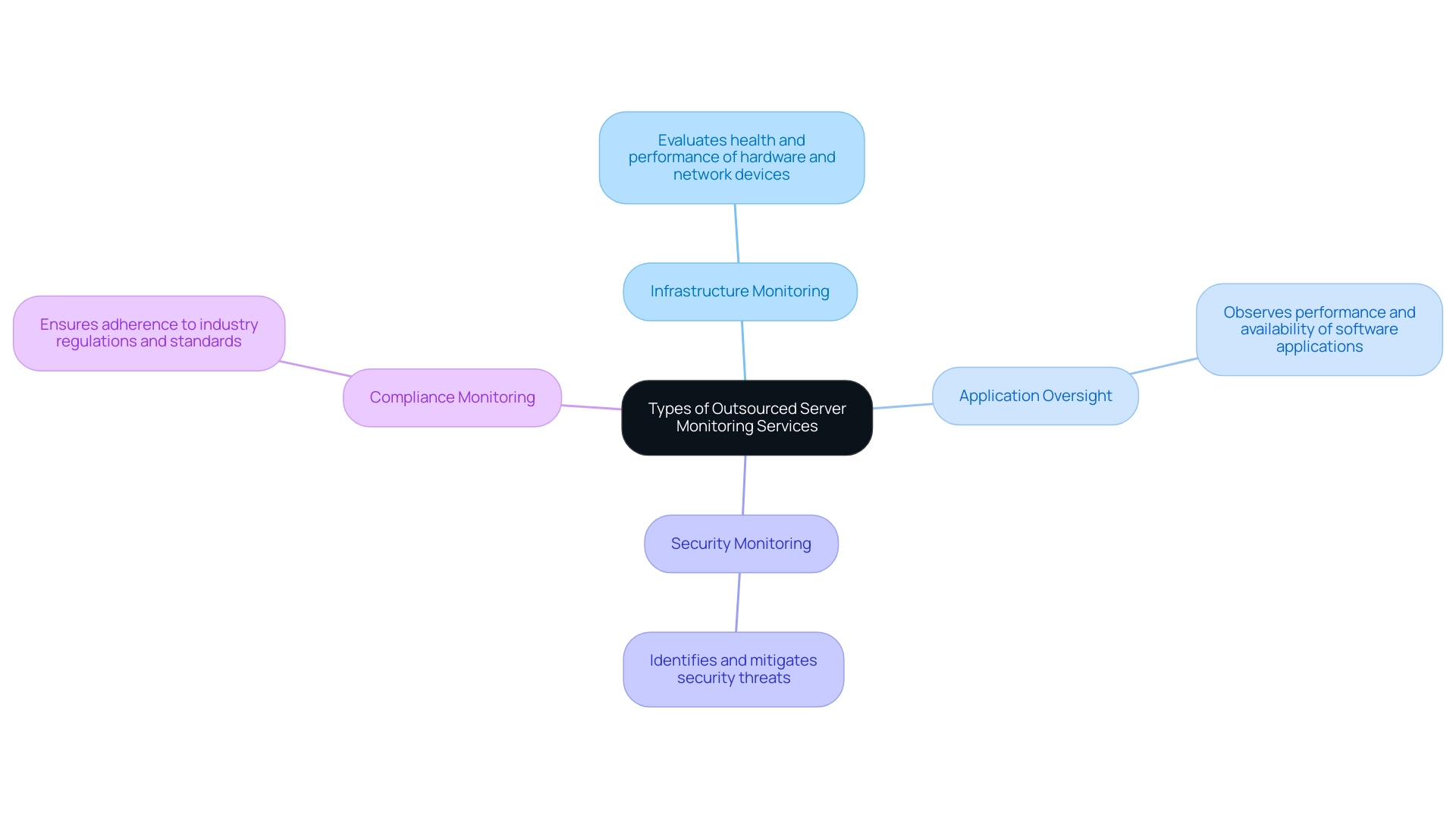
The Importance of 24/7 Monitoring in Server Management
Ongoing 24/7 oversight provided by outsourced server monitoring is crucial for efficient system management, enabling the prompt identification and resolution of performance-affecting problems. The imperative nature of this oversight cannot be overstated, as downtime can severely affect revenue and tarnish a company’s reputation. In 2024, it is projected that companies experiencing significant outages may incur losses amounting to millions in potential revenue, alongside diminished consumer trust.
Moreover, real-time monitoring equips organizations to respond rapidly to security incidents, thereby minimizing the risk of breaches. As highlighted by recent news, error rates should be closely monitored by system administrators, as an increasing percentage of errors in relation to overall requests may indicate serious issues requiring immediate attention. According to Vlad, co-founder and CTO of Scala Hosting, "Book a meeting and receive a complimentary 30-minute consultation with Vlad, co-founder & CTO of Scala Hosting, who will assist you in choosing, designing, and constructing the appropriate solution - from a single data center cluster to a multi-region & multi-datacenter high availability cluster with hundreds of machines."
This emphasizes the significance of customized solutions for sustaining strong computing environments. Furthermore, studies of management systems demonstrate that effective monitoring tools not only track operational data in real-time but also analyze historical performance, allowing IT managers to differentiate between performance and hypervisor functions. For instance, a management system can gather information across multiple systems, offering insights that help prevent downtime.
Ultimately, businesses can achieve optimal performance, enhance security, and significantly bolster customer satisfaction and trust by utilizing outsourced server monitoring to ensure their hosting environments are under constant supervision. Furthermore, with Splunk accessible in 21 areas globally, organizations can utilize worldwide best practices in system oversight.
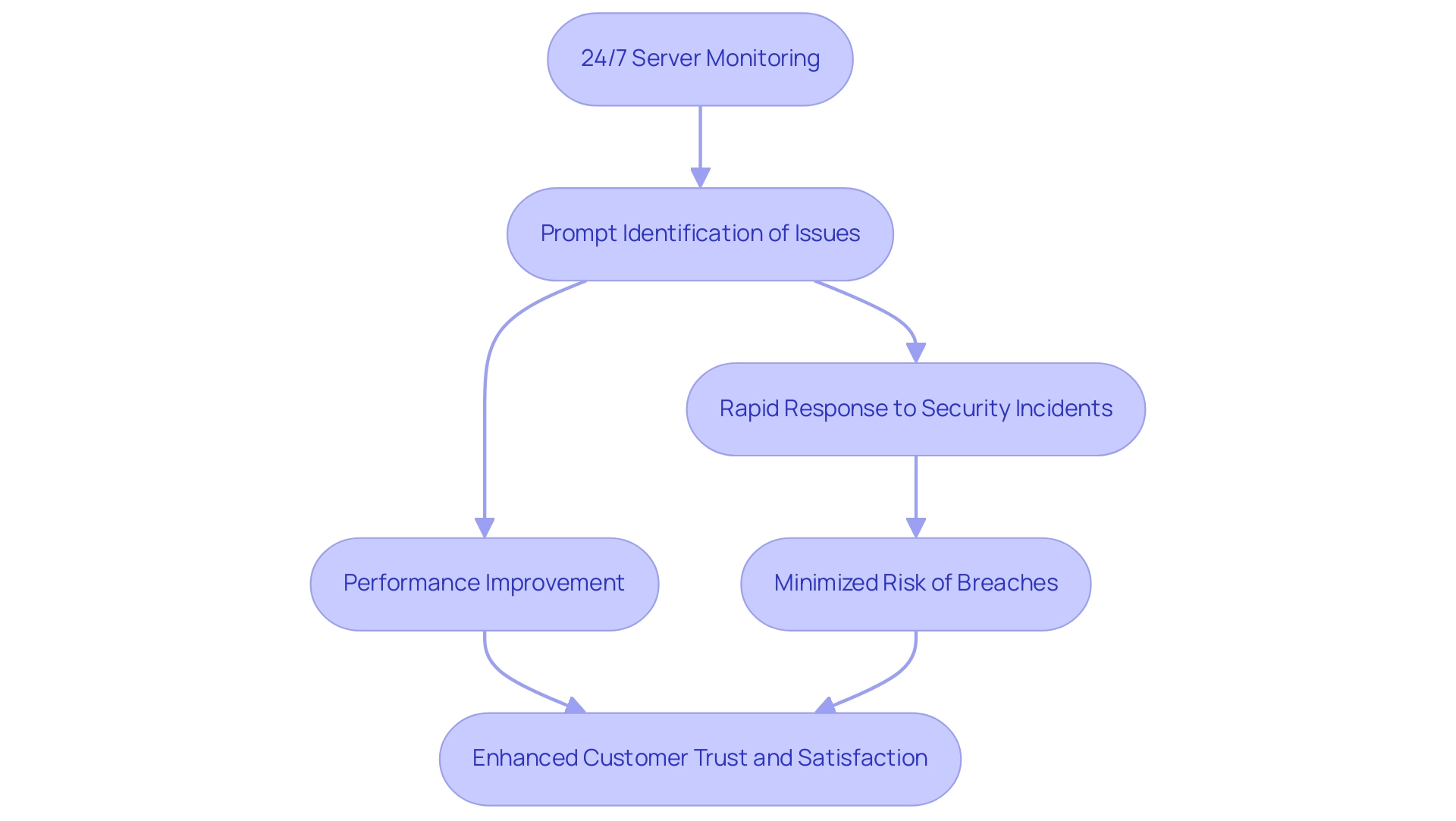
Choosing the Right Outsourced Server Monitoring Provider
Choosing an external provider for oversight requires a thorough strategy, with several essential criteria to take into account:
- Experience and Expertise: It is imperative to evaluate the provider's track record within your specific industry. Their experience can greatly influence the effectiveness of oversight solutions tailored to your operational needs.
- Service Level Agreements (SLAs): A thorough review of the SLAs is essential. Ensure that these agreements align with your business requirements, particularly regarding response times and uptime guarantees, which are vital for maintaining operational integrity. As emphasized in recent industry talks, the importance of SLAs in system management services cannot be overstated; they serve as a foundation for performance accountability and operational success.
- Technology and Tools: Evaluate the technology and oversight tools utilized by the provider. Best-in-class server monitoring solutions, including outsourced server monitoring, enable the overlaying of performance metrics from multiple sources, allowing for a comprehensive analysis that can significantly enhance decision-making processes.
- Customer Support: The level of customer support is a critical factor. Assess the availability and responsiveness of support options, as effective communication is crucial in addressing issues swiftly and minimizing downtime.
- Scalability: Future growth and changing needs necessitate that the provider can scale their services accordingly. A adaptable partner guarantees that your oversight abilities develop in tandem with your business.
By carefully assessing these elements, organizations can establish alliances that not only correspond with strategic goals but also improve their overall system management capabilities. Significantly, the market for oversight tools is expected to reach $4.98 billion by 2019, with a compound annual growth rate (CAGR) of 12.86 percent, further highlighting the importance of selecting the right provider in a swiftly changing environment. According to the MarketsandMarkets report on APM tools, the DevOps market is expected to grow to $8,763.8 million by 2023, growing at a CAGR of 18 percent during 2017-2023.
Additionally, the SolarWinds Server & Application Monitor (SAM) serves as a prime example of a successful server oversight solution, designed to deliver agentless surveillance for various applications and operating systems across different environments. SAM integrates with other Orion Platform products, providing unified monitoring and deeper insights into web performance, storage, network, and virtualized resources.
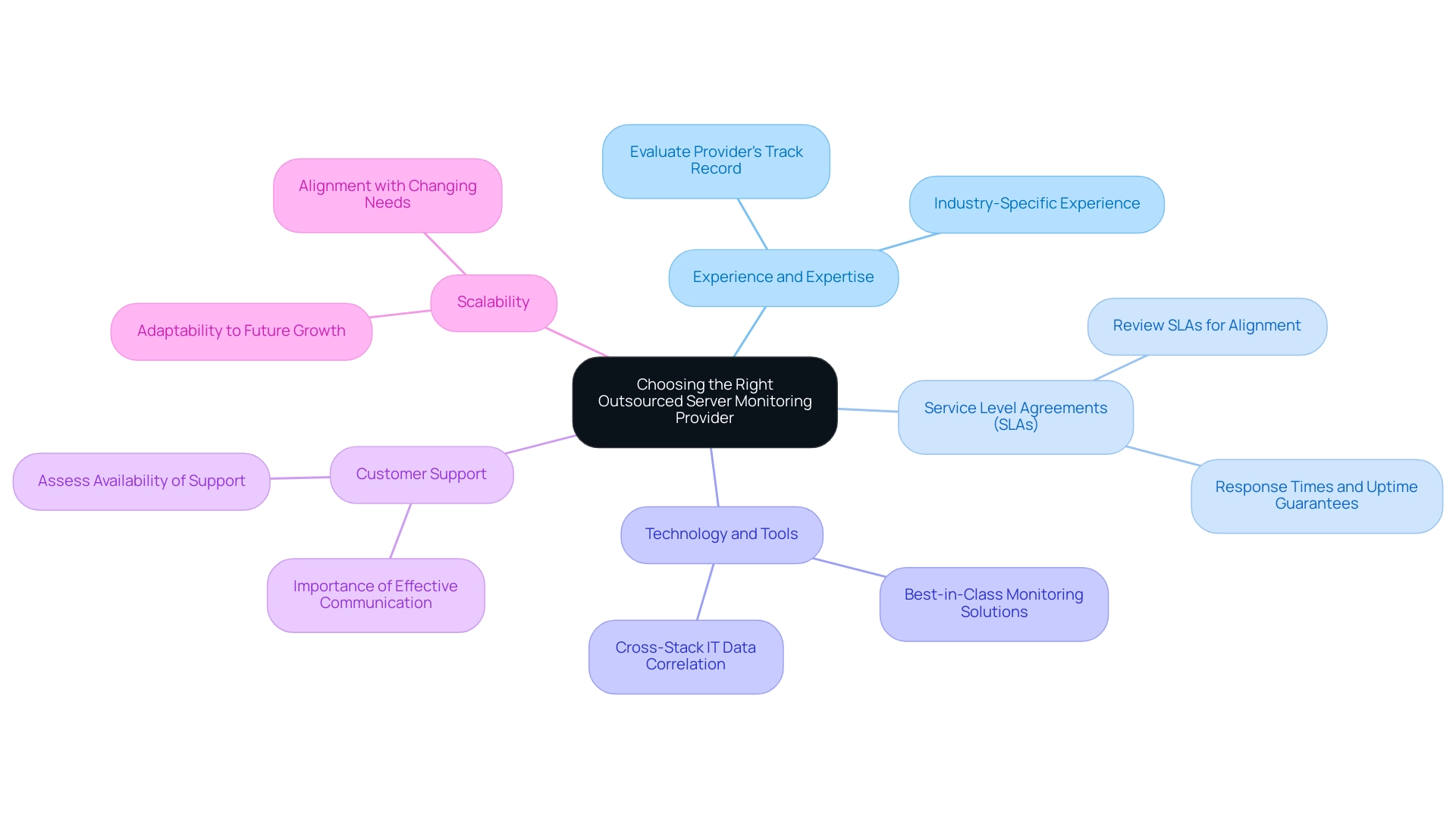
Conclusion
Outsourced server monitoring presents a transformative approach for organizations striving to enhance their IT operations while maintaining robust security measures. By delegating server oversight to specialized third-party providers, businesses can leverage expert knowledge and advanced technologies that ensure continuous monitoring and rapid response to potential threats. This strategic shift not only alleviates the burden on internal teams but also allows them to focus on core business objectives, thus fostering innovation and growth.
The key benefits of outsourcing server monitoring include:
- Significant cost savings
- Access to specialized expertise
- Enhanced security protocols
- Improved operational efficiency
As organizations increasingly recognize the value of these advantages, the demand for outsourced monitoring services continues to rise, indicating a strong trend towards this model as a means of optimizing IT management.
Ultimately, organizations must carefully evaluate their options when selecting an outsourced server monitoring provider, considering factors such as:
- Experience
- Service level agreements
- Technology
- Customer support
- Scalability
By making informed decisions, businesses can secure partnerships that not only align with their strategic goals but also contribute to a resilient and efficient IT infrastructure. As the digital landscape evolves, embracing outsourced server monitoring will be pivotal for organizations aiming to thrive in an increasingly competitive environment.




